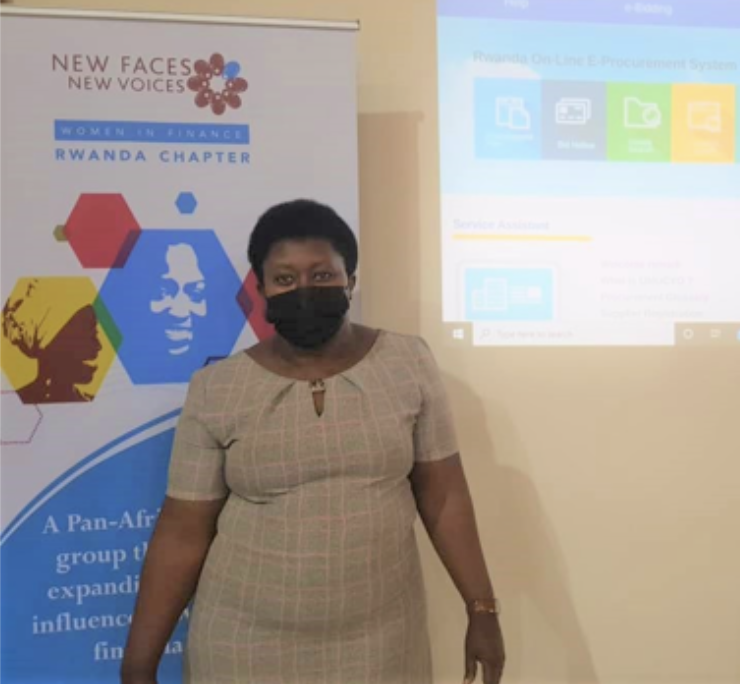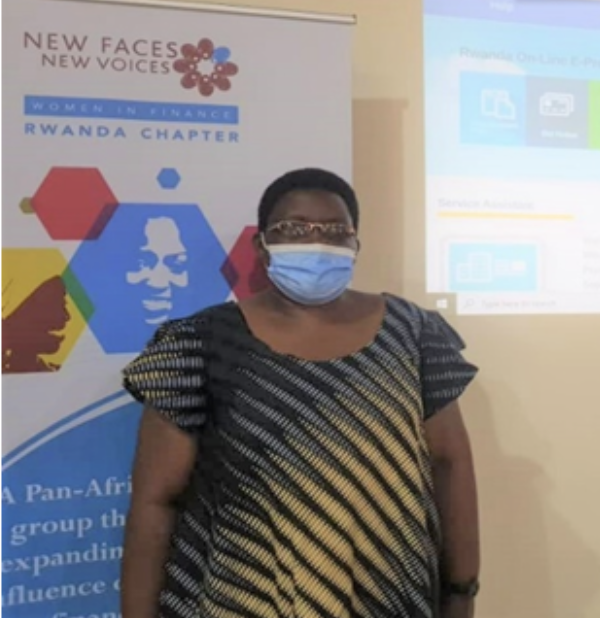Including more women-owned businesses in public procurement processes can empower them and benefit governments. According to the World Bank, 35% of all small to medium enterprises (SMEs) are women-owned, producing around 20% of GDP. United Nations Global Markets estimates that, in 2019, the UN spent close to USD 19.9 billion on goods, services and civil works purchases for its functions through governments, companies, and other non-governmental organisations. However, only less than 1 % of women-owned businesses access the procurement market and are awarded the contracts.
In Africa, 70% of economically active women are in the informal sector, with limited access to financial services, hindering opportunities to advance gender equality goals and further spur inclusive economic growth that promotes women as active central participants. Financial inclusion is a key aspect of this.
The Graça Machel Trust’s New Faces New Voices (NFNV) network expands the role and influence of women in the financial sector and advocates for women’s access to finance and financial services. Not only does the network aim to bridge the funding gap in financing women-owned businesses across Africa and advocate for policy and legislative changes. But works in collaboration with other networks and key stakeholders in the financial sector to identify barriers to women-owned business-friendly procurement inclusion such as inadequate national legislation and policies and how government tenders are naturally designed with excessive requirements for public procurement.
Recently, New Faces New Voices Rwanda hosted a two-day Public Procurement for Women Entrepreneurs training workshop with the Rwanda Public Procurement Authority. This is a continued effort dedicated to training women entrepreneurs about public procurement procedures and the use of the Rwanda E-procurement system, called ‘UMUCYO’ to increase their access to public tenders. UMUCYO is a single channel, portal and point of access for Rwanda procuring entities allowing them to negotiate better contract terms and realise savings and achieve value for money. The workshop took place in August 2021 in the Muhanga district, Southern Province of Rwanda, where 36 women entrepreneurs were trained. It covered essential topics on tender procedures and use of e-procurement, including; Legal and regulatory framework, Fundamental principles of public procurement, Preparation of tender document, review process and Rejecting and cancellation of all bids.

Uwase Solange, Owner of Ineza polyclinic, a Health Clinic in the Muhanga district- Rwanda
Uwase Solange, Owner of Ineza polyclinic, a Health Clinic in the Muhanga district, expressed appreciation for the training opportunity. “Now I have the confidence to navigate the platform, search for procurement plans of different public institutions, and advertise tender for my business”, she said.
Rachel Uwayo is the owner of Nezerwa Company, an Agro-processing business in Muhanga district, who was also a beneficiary of the training. She said, “I thank New Faces New Voices, UN Women and Rwanda Public Procurement Authority for organising training about public tender procedures and the use of e-procurement. I used to think government tenders belong to a certain category of companies, but I have learnt that company is also eligible.”

Rachel Uwayo – Owner of Nezerwa Company, an Agro-processing business in Muhanga district- Rwanda
The workshop responds to one of the recommendations stated in a Responsive Procurement study conducted by NFNV Rwanda in partnership with UN Women in 2019. The Gender-responsive procurement in Rwanda study objective study was to gather information and evidence to enable stakeholders to make informed decisions and proposals for furthering gender equality and women’s empowerment through successful tendering in public procurement. The study revealed that women participation level was low at 13% from an indicative sample of 332 public tenders awarded in 2016/2017 and 2018/19 and 5% in value of the 34.5 Billion surveyed tenders.
This article was compiled by Ida Ingabire, Coordinator.
Read more about how New Faces New Voices is working to advance women’s financial inclusion in this technical report










 The Trust supports and mobilises civil society networks on issues of ending child marriage, ending violence against children, ending female genital mutilation and promoting children’s rights, to carry out advocacy and action across Africa. Special focus is placed on Malawi, Mozambique, Tanzania and Zambia where child marriage continues to be a problem largely driven by poverty, gender inequality, harmful traditional practices, conflict, low levels of literacy, limited opportunities for girls and weak or non-existent protective and preventive legal frameworks.
The Trust supports and mobilises civil society networks on issues of ending child marriage, ending violence against children, ending female genital mutilation and promoting children’s rights, to carry out advocacy and action across Africa. Special focus is placed on Malawi, Mozambique, Tanzania and Zambia where child marriage continues to be a problem largely driven by poverty, gender inequality, harmful traditional practices, conflict, low levels of literacy, limited opportunities for girls and weak or non-existent protective and preventive legal frameworks.




 Education is a fundamental right for all children, which is also a vehicle for social, economic and political transformation in communities, countries and the African continent at large. Recent studies indicate a lack of progress in some of the critical commitments aimed at improving education quality, access, retention and achievement, particularly for girls. In most African countries, girls may face barriers to learning, especially when they reach post-primary levels of education. By implementing multi-dimensional approaches to education which includes core education, personal development, life skills and economic competencies, the Trust partners with funding partners, governments, civil societies and the private sector to improve education access.
Education is a fundamental right for all children, which is also a vehicle for social, economic and political transformation in communities, countries and the African continent at large. Recent studies indicate a lack of progress in some of the critical commitments aimed at improving education quality, access, retention and achievement, particularly for girls. In most African countries, girls may face barriers to learning, especially when they reach post-primary levels of education. By implementing multi-dimensional approaches to education which includes core education, personal development, life skills and economic competencies, the Trust partners with funding partners, governments, civil societies and the private sector to improve education access.

 The Nutrition and Reproductive, Maternal, New-born, Child and Adolescent Health and Nutrition, (RMNCAH+N) of the Children’s Rights and Development Programme aims at promoting the Global Strategy for women, children and adolescents’ health within the Sustainable Development Goals (SDG) agenda. The strategy emphasises on the importance of effective country leadership as a common factor across countries making progress in improving the health of women, children and adolescents.
The Nutrition and Reproductive, Maternal, New-born, Child and Adolescent Health and Nutrition, (RMNCAH+N) of the Children’s Rights and Development Programme aims at promoting the Global Strategy for women, children and adolescents’ health within the Sustainable Development Goals (SDG) agenda. The strategy emphasises on the importance of effective country leadership as a common factor across countries making progress in improving the health of women, children and adolescents. Through its Early Childhood Development (ECD) plan, The Trust will seek to put into action the new science and evidence Report that was presented by Lancet Series on Good and early development – the right of every child. This will be achieved by mobilising like-minded partners to contribute in the new science and evidence to reach all young children with ECD. The Trust’s goal is to be a catalyst for doing things differently, in particular, to rid fragmentation and lack of coordination across ECD sectors. In response to evidence showing the importance of political will in turning the tide against the current poor access and quality of ECD. Even before conception, starting with a mother’s health and social economic conditions, the early years of a child’s life form a fundamental foundation that determines whether a child will survive and thrive optimally.
Through its Early Childhood Development (ECD) plan, The Trust will seek to put into action the new science and evidence Report that was presented by Lancet Series on Good and early development – the right of every child. This will be achieved by mobilising like-minded partners to contribute in the new science and evidence to reach all young children with ECD. The Trust’s goal is to be a catalyst for doing things differently, in particular, to rid fragmentation and lack of coordination across ECD sectors. In response to evidence showing the importance of political will in turning the tide against the current poor access and quality of ECD. Even before conception, starting with a mother’s health and social economic conditions, the early years of a child’s life form a fundamental foundation that determines whether a child will survive and thrive optimally.